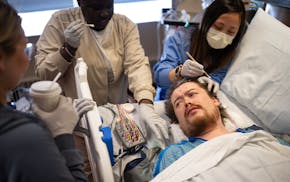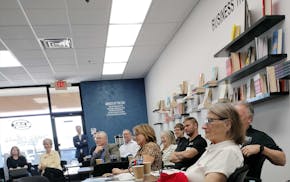With a mountain of technical and creative talent and the headquarters of some of the biggest and most influential food companies in the country, Minnesota should be spinning out nationally recognized grocery store hits nonstop.
Should be.
"We are so resource-rich," said Allison Hohn, executive director of local food-biz group Naturally Minnesota. "Yet no one thinks of us as the hub of food and ag innovation."
That's not a new problem, Hohn said, but it requires urgent solutions.
"We have every right and reason to win," she said.
Hohn has led Naturally Minnesota, formerly known as Grow North, for nearly five years. She has helped launch dozens of startups, only to see many languish in the liminal space between early success and meaningful growth.
That needed boost comes in the form of a check.
"The medtech industry has been really successful in getting their community to reinvest, but that has not happened in the food and ag community," Hohn said. "The only way people want to give back is with their time, and people are overmentored."
It will take a cultural shift, and much more, to replicate the medtech arc in food, she said. Other industry observers have shared similar sentiments in recent years.
Hohn, a 39-year-old St. Paul native, has worked for Land O'Lakes and Target. She flexed her expertise to explain the issues facing Minnesota's food and ag startup ecosystem — and what to do about it all — in an interview edited for clarity and length.
Local food brands have a hard time finding investors. Why?
Minnesota is very culturally conservative when it comes to capital. We don't talk about it. People stash it away because we've got to save up for the winter. It's the same few families that fund everything locally, and there are no midsize investors.
So it's really frustrating because there's so much latent capital sitting around. And I agree, on the one hand, when people say, "Well, how do you know what's going to be a good investment?" Food and ag is a long-term play. It's extremely capital-intensive. It's not the same as investing in software, where you can get a return in three years. I get the hesitation.
However, for people who have lived and died in this industry: Where are you? Anyone who has exited a business: How are you paying it forward? There are investable companies here.
Where are the other pain points for entrepreneurs?
So many people don't have social capital. And that is actually one of the things I love about my job: I get to freely give social capital away. Entrepreneurs can get overwhelmed and confused. They don't know who to go to.
That is where I have probably been more helpful in one-on-one conversations with founders, to ask, "Where are you at? Have you thought about this?" And then introduce them to 10 people. I'll meet with about 250 entrepreneurs every year and about 400 industry folks.
And I have lived the journey. I was a scientist. I've gone from pilot plant to full-scale commercialization. I got a second master's in supply chain management to understand the unsexy middle of this, and then I spent time at a retailer to understand, "How does a retailer look at food products? How do trends and insights play into all that?"
What can industry supporters do?
Show up. It's a very interesting paradox here, because people are so giving and so thoughtful and would be so helpful if they got out of their house.
People in Austin, Texas, have a better chance of meeting the ex-CEO of something to learn from them on the ground because they stick around, physically, and show up to events.
See an event that sounds interesting? Actually go. And don't just talk to the same three people you know — I'm guilty of this, too. Yes, everyone's time is valuable, and we're all being pulled in multiple directions all the time with obligations. But the only way to meet that person, hear that insight, taste that next great product is to be there.
Corporations need to encourage folks to participate in the ecosystem. There's maybe 5% of the workforce that would be keen to be involved. How do we eliminate those barriers so they can freely support small companies?
Can the Legislature help?
Make the Angel Tax Credit available to everyone. You can't get that if you're a CPG (consumer packaged goods) company; it's nigh impossible.
There's a general lack of support or infrastructure, and it comes back to the tax code. There are so many people who want to set up manufacturing here, but it's too expensive. Our government is not doing us any favors.
What role does the Bold Growth accelerator program play?
What we do with that program is the most unique thing in the entire country when it comes to accelerators.
Most of Naturally Minnesota's work is for companies with a million in revenue and under. This specifically targets $5 million to $50 million. The reason is we don't have a lot of exits in Minnesota. Why is that?
The program is six months to a year. We sit down with them, and we say, "What's going to double your revenue? What's a hurdle you need to clear in order to have your next phase of growth?" [Nutrition shot maker] So Good So You, they're the poster child of the program. They probably quadrupled in size.
What will Naturally Minnesota's annual Food Ag Ideas Week focus on this fall?
Food as health. Minnesota, more than anywhere, should be the place to lead the new frontier of how food and ag and health care intersect. But right now, they are tankers moving in opposite directions.

Could North Memorial close? Hospital issues a warning, a glimpse of what's at stake.

Minnesota small-business owners eye tax cut tangled in sprawling federal bill
Market volatility leaves some Minnesotans uneasy about 401(k) retirement investments
Minnesota pensions embraced investing in private equity, a big risk that's paid off

